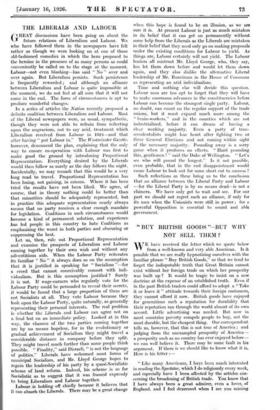THE LIBERALS AND LABOUR
GREAT discussions have been going on about the future relations of Liberalism and Labour. We who have followed them in the newspapers have felt rather as though we were looking on at one of those old-fashioned comedies in which the hero proposed to the heroine in the presence of as many persons as could conveniently be called on to the stage at the moment. Labour—not even blushing—has said " No " over and over again. But Liberalism persists. Such persistence is frequently rewarded ; and although an alliance between Liberalism and Labour is quite impossible at the moment, we do not feel at all sure that it will not come in the end. The force of circumstances is apt to produce wonderful changes.
In a series of articles the Nation recently proposed a definite coalition between Liberalism and Labour. Most of the Liberal newspapers were, as usual, sympathetic, though they were not able to refrain from reflecting upon the ungracious, not to say acid, treatment which Liberalism received from Labour in 1924—and that after having " put Labour in." The Westminster Gazette, however, denounced the plan, explaining that the only way to ensure co-operation with Labour was first to make good the ground by introducing Proportional Representation. Everything desired by the Liberals would then follow as surely as the day follows the night. Incidentally, we may remark that this would be a very long road to travel. Proportional Representation has been losing, not gaining, in esteem. Where it has been tried the results have not been liked. We agree, of course, that in theory nothing could be better than that minorities should be adequately represented, but in practice this adequate representation nearly always means that no party receives a clear enough mandate for legislation. Coalitions in such circumstances would become a kind of permanent solution, and experience has led people in this country to hate Coalitions as emphasizing the worst in both parties and obscuring or suppressing the best.
Let us,_ then, rule out Proportional Representation and examine the prospects of Liberalism and Labour coming together by their own wish and without any adventitious aids. When the Labour Party reiterates its familiar " No " it always does so on the assumption that it is justified in speaking for " Socialism "—for a creed that cannot conceivably consort with indi- vidualism. But is this assumption justified ? Surely it is not. If wage-earners who regularly vote for the Labour Party could be persuaded to reveal their secrets, it would be found that a large proportion of them are not Socialists at all. They vote Labour because they look upon the Labour Party, quite naturally, as generally representing- their personal interests. The real problem is whether the Liberals and Labour can agree not on a final but on an immediate policy. Looked at in this way, the chances of the two parties coming together arc by no means hopeless, for in the evolutionary or gradual achievement of Socialism they might travel a considerable distance in company before they split. They might travel much further than some people think possible. " Finality," said Disraeli, " is not the language of politics." Liberals have welcomed most forms of municipal Socialism, and Mr. Lloyd George hopes to regain the leadership of his party by a quasi-Socialistic scheme -of–land reform. Indeed, his scheme is so far Socialistic as to suggest that it was framed expressly to bring Liberalism and Labour together. • Labour is holding off chiefly because it, believes that it can absorb the Liberals. There may be a great change when this hope is found to be an illusion, as we are sure it is. At present Labour is just as much mistaken in its belief that it can get on permanently without some help from the Liberals as the Liberals are mistaken in their belief that they need only go on making proposals under the existing conditions for Labour to yield. As things are, Labour certainly will not yield. The Labour leaders all mistrust Mr. Lloyd George, who, they say, has let them down before and would let them down again, and they also dislike the alternative Liberal leadership of Mr. Runciman in the House of Commons as representing an arid individualism.
Time and nothing else will decide this question. Labour men are too apt to forget that they will have to make enormous advances in the constituencies before Labour can become the strongest single party. Labour, no doubt, can count on the regular support of the trade unions, but it must expand much more among the " brain-workers," and in the counties which are not industrialized, before it can dream of having a clear working majority. Even a party of tran- scendentalists might lose heart after fighting two or three General Elections and not coming within sight of the necessary majority. Pounding away is a sorry game when it produces no effects. " Hard pounding this, gentlemen ! " said the Duke of Wellington. " Let's see who will pound the longest." Is it not possible, even probable, that in the end disappointment would cause Labour to look out for some short cut to success ?
Such reflections as these bring us to the conclusion that an alliance between the Liberal Party and Labour —for the Liberal Party is by no means dead—is not a chimera. We have only got to wait and see. For our part we should not regret such an alliance, if only for its uses when the Unionists were still in power ; for a powerful Opposition is essential to sound and able government.














































 Previous page
Previous page